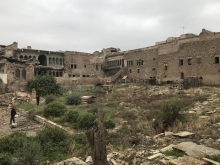State Department Awards Penn Team $2 Million to Preserve Cultural Heritage in Northern Iraq

When ISIS terrorists in northern Iraq destroyed cultural heritage sites in and around Mosul, they frequently targeted minority groups including Christians, Yazidis, Shia, Kurds, and other groups for cultural cleansing and genocide. Now, in an effort to revitalize the city and the culture of the people who live there, the U.S. Department of State has awarded the University of Pennsylvania $2 million for a three-year, two-phase stabilization project.
In part one, already underway, a team led by Penn archaeologist Richard L. Zettler, Associate Professor in the Department of Near Eastern Languages and Civilizations, and archaeologist Michael Danti, GR’00, will conduct assessments and implement small-scale repairs at 15 to 20 sites in the area. The second phase will involve the prioritization of sites for conservation.
“Our goal is to rewind and repair the damage done, to address the blatant attempts to erase cultural memory and freedom of expression,” says Danti, the project manager. “ISIS aggressively targeted cultural heritage and cultural diversity in Mosul. Anything that didn’t conform to their narrow interpretation of Islam was fair game.”
Penn has been active in Iraq for more than a century, and Zettler has had a relationship with the University of Mosul, a key partner in the new project, for the past five years. “We feel deeply connected to our colleagues in Mosul and appreciate the chance to help them rebuild their region after the Islamic State’s devastating campaign of cultural genocide,” Zettler says.
In November, the researchers visited the area for 10 days to conduct an initial on-the-ground survey. They saw the damage inflicted on Christian churches and monasteries in east Mosul, as well as in the old city on the west side of the Tigris. They also visited the site of what had been the bent minaret of the al-Nuri mosque, an important symbol of Mosul that was blown up by the terrorist group as the Iraqi army closed in on the area.
Though ISIS was driven out in July 2017, its presence is still palpable across the city. Danti describes the destruction as something akin to the hardest-hit areas in Europe after World War II, with rubble heaps and unexploded devices on block after block. “This is the worst cultural heritage crisis since the Second World War,” he says. “We’re going to be dealing with this for decades.”
This project is an important start, Danti adds. “It’s a very complicated area of cultural heritage. We look at this first three-year period as triage. It’s going to take a long time. When you back up and look at what happened, the whole of Mosul had been flattened.”
With the help of Ali Jubbouri, former dean of the University of Mosul’s College of Archaeology, and the assistance of architects and engineers in Mosul’s College of Engineering, Zettler and colleagues will begin assessing the condition of 15 to 20 sites. They’ll undertake any immediate repairs needed and then, at the end of six months, make recommendations to the U.S. government for feasible, longer-term projects.
Part of the feedback will come from input from Zettler’s colleagues in the Department of Near Eastern Languages and Civilizations, such as Professor Paul Cobb, who focuses on medieval history; Associate Professor Joseph Lowry, an expert on Islamic law and literature; and Professor Heather Sharkey, a historian who concentrates on minority religious communities in the Middle East.
“The University of Pennsylvania has a long history of work in Iraq. We cast a long shadow on the ground there. People know us,” Zettler says. “But it’s not enough just to be able to go in and do the work. It’s important to have intellectual backup for a project like this, and Penn can bring that to the table in a way that a different organization might not be able to.”
Funding for the 40-month project comes from a Department of State Cooperative Agreement, S-NEAAC-18-CA-0043, under the U.S. Ambassadors Fund for Cultural Preservation.
Richard L. Zettler is also associate curator-in-charge of Penn Museum’s Near East Section.
Michael Danti is a consulting scholar in Penn Museum’s Near East Section. He is also academic director of the American Schools of Oriental Research Cultural Heritage Initiatives.
Allison Cuneo, project coordinator, specializes in cultural heritage management. She is currently a post-doctoral fellow at the Massachusetts Institute of Technology.





